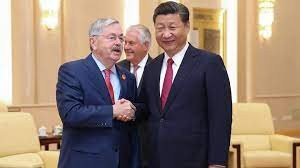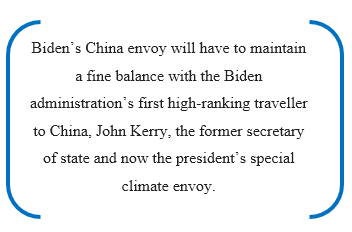Hemant Adlakha, Honorary Fellow, ICS

Source: bloomsberg.com
Summary
President Biden’s China policy in his first hundred days is already drawing flak in Beijing. Notwithstanding recently witnessed smart US-China “climate diplomacy” during Washington-sponsored Earth Summit, the US watchers in the People’s Republic are further irked by weird signals Biden is sending in picking Nicholas Burns as the next China envoy.
“The US ambassador to Beijing must be someone who can show to the world the importance of the Unites States’ relationship with the Peoples’ Republic of China,” is how a former US envoy to China under President Obama reacted to the news of the likely Biden pick for the job. “It’s also critical that the person is empowered to negotiate on the president’s behalf and should not just be a person to deliver messages,” the former Montana Democrat Senator was quoted in the US media when Bloomberg first disclosed two months ago that Nicholas Burns might be the next China envoy.
On March 18, the South China Morning Post’s seasoned China correspondent Shi Jingtao in an exclusive report claimed that Beijing had decided to stay on with Cui Tiankai, as China’s envoy to the US during the Biden presidency. Cui is already well over the usual retirement age for a Chinese official of his rank but “his connections and knowledge” are highly valued, citing sources in Beijing, Jingtao wrote. It is pertinent to point out, given that the Party general secretary, who is also at the same the President of the PRC, is assigned the responsibility by the seven-member politburo standing committee – the CPC’s highest decision making body – to deal with China’s affairs with the United States, which means Cui Tiankai is Xi Jinping’s man in Washington.

Image: Chinese envoy in US Cui Tiankai: Xi Jinping’s “Mr. Indispensable”
Source: news.cgtn.com
Furthermore, if what Shi Jingtao claims is true, then it is clear that 71-year old Cui or Xi Jinping’s “Mr. Indispensable” will be creating a history of sorts in the diplomatic annals by serving as Xi’s ambassador in Washington for long 11 years. It was the newly appointed Chinese president Xi, who picked Cui as the Chinese ambassador to the US in 2013. Cui’s continuation as China’s envoy in Biden era is also indicative of Beijing’s conviction that China-US rivalry is here to stay, at least for the next four years if not beyond. Let us recall, following the Alaska talks failure last month, China’s “independent” English language CX Daily in reaction to Biden administration’s relentless vitriol against China did predict that in Biden era and beyond “we are going to see at least 10 years of frosty ties between Beijing and Washington.”

Let us return to the early reactions to Burns as the next potential US envoy for China. In the US media, as soon as the news of Nicholas Burns being considered for the most crucial ambassadorial appointment under the new Biden administration was disclosed two months ago, the reactions were positive and welcoming. While the state department and the White House both made it clear the next China envoy must be finalized based on the more “traditional mix of political and career,” the purpose was also to have fewer (key) political appointees than during Trump presidency. On the other hand, most ex-diplomats and foreign affairs experts too underscored the importance of having someone in Beijing who will be “perceived as having influence with the President Joe Biden.”
The influential Bonnie Glaser, a senior advisor for Asia and the director of the China Power Project at the Centre for Strategic and International Studies in Washington, emphasized the person (the likely China envoy) to have access to both Biden and Xi. “The most important thing I think for an ambassador is to have a good relationship with the President and have some ability to directly communicate with the President and the key people around him.” she was quoted by the CNN as saying. “It’s important for the person to have access to Xi Jinping as well,” Glaser added.
In Beijing, the first thing commentators have pointed out is the strange “missing” of the US envoy since October last year when Terry Branstad was unceremoniously recalled by President Trump, saying “Branstad would be coming home from China” as he wanted to join the presidential campaign. Branstad, a former long-time Iowa governor was handpicked to the posting in Beijing by Trump in part because of the ambassador’s strong personal relationship with Xi Jinping. Earlier on in February, scholars in China had commented on the new President’s going slow in finalizing ambassadorial nominees to several countries, including China.

Source: cbs2iowa.com
Diao Ming, a well-known expert on US-China relations and professor at the Renmin University in Beijing had told the Global Times: “Since Biden’s major officials in the foreign affairs sector attach great importance to China affairs, the ambassador to China needs to be a person with strong experience in politics, top-class professionalism, a well-known reputation and prestige in political circles, as well as trust from the president.” For Branstad, though ambassadorship came as political “reward,” he not only fitted the bill in several ways but he also proved to be a hit with the authorities in Beijing.

“Branstad’s departure would be a loss to China-U.S. diplomacy as it would mean one less political heavyweight with a deep understanding of China based here,” was how Wang Huiyao, an adviser to China’s cabinet and founder of the Centre for China and Globalization, had reacted to the news of the end of Branstad’s tenure. Branstad had arrived in Beijing as the US envoy during the early days of the new Trump administration. Branstad was also one of the first ambassadorial announcements – made as early as in December 2016, within a month of Trump’s victory.
Just like Branstad, if appointed, Burns too will be among the first diplomatic nominees under President Biden. Burns’ reputation of a “no-nonsense” veteran professional diplomat – he has been a former ambassador, had served in the state department under the Bush administration and enjoyed his role in academic circles as professor with the Harvard Kennedy School – is well-acknowledged by the Global Times which has declared him as the “ideal choice for the position of US ambassador to China.” Interestingly, the GT, known for its strong hawkish views, while ignoring harsh remarks on China made by Burns in 2017 has lavishly praised the career diplomat for not “holding extreme views on China.” “Given his views on China that are not extreme, it is unlikely China will be averse to him. It should be said that Biden’s choice for Burns is very reasonable,” the newspaper opined.

Source: Bloomberg.com
In contrast to the GT commentary, Shanghai-based influential and widely popular Chinese language online news platform guancha.cn, has described Burns as “senior professional diplomat but not a diplomatic veteran.” Echoing what Hans Nichols wrote of Burns for AXIOS two weeks ago, cited above, the guancha.cn observed “choosing Burns would be indicating a preference for a seasoned diplomat instead of a high-wattage politician.” The online news platform did not fail to point out however that the past four US ambassadors in succession were all influential politicians. Guancha.cn also wondered on the choice of Burns as the US envoy for three additional reasons: one, Burns is known to be an expert on “Soviet Union” and Europe and not for handling China’s affairs; two, he would be filling in the challenging diplomatic assignment as “non-China” hand and that too when the coveted position in Beijing has been vacant for the past six months at a time considered as the most difficult period in the last 40-years of the bilateral relationship; and finally, unlike his past predecessors, Burns will have tough time doing liaison between President Biden and Blinken-Sullivan-Campbell trio. Not to forget, Biden’s China envoy will have to maintain a fine balance with the Biden administration’s first high-ranking traveller to China, John Kerry, the former secretary of state and now the president’s special climate envoy.
To sum up, as Lü Xiang, an expert in US studies at the Chinese Academy of Social Sciences has observed, Biden will decide on who will represent Washington in Beijing “once the state department announces comprehensively the US foreign affairs plan.” But scholars in Beijing are also saying, though Burns may not be a political heavy weight and “an old friend of Chinese people” like his immediate predecessor was, yet Beijing might be pleased with him. For the simple reason that he not only strongly supports the view that the US-China “decoupling” is impossible and that cooperation between the two largest economies is a must in containing Covid-19 pandemic and in climate change. But also because like his immediate predecessor who actively tried to ease China-US tensions, if experienced and professional diplomat like Burns succeeds as ambassador to China, he will play an even greater role than Branstad.
(1397 words)
This is modified version of an earlier article published by the NIICE, Kathmandu under the title
‘Nicholas Burns for China Envoy: Is Biden Sending Wrong Signals to Beijing?’ on 26 April, 2021